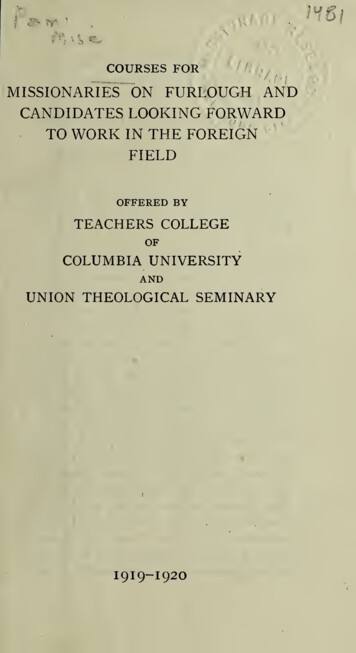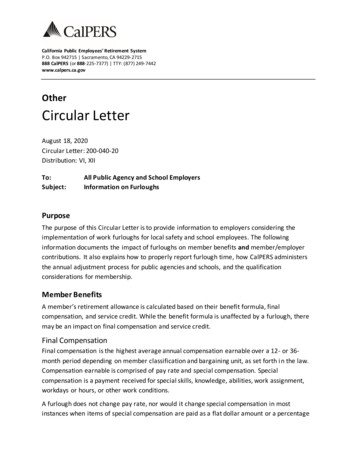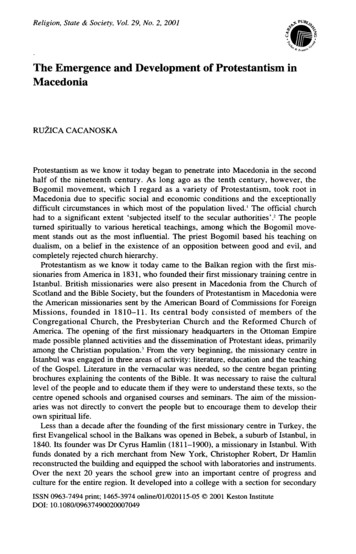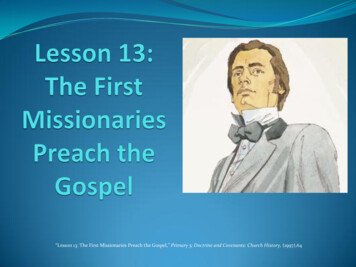
Transcription
tH6\v*i»tj/Yv i * f t a(N, .1 '/COURSES FORMISSIONARIES ON FURLOUGH ANDCANDIDATES LOOKING FORWARDTO WORK IN THE FOREIGNFIELDOFFERED BYTEACHERS COLLEGEOFCOLUMBIA UNIVERSITYANDUNION THEOLOGICAL SEMINARY1919-1920,
TEACHERS COLLEGEof Columbia UniversityandUNION THEOLOGICAL SEMINARYCOURSES FOR MISSIONARIESThe needs of the foreign field are nowsufficientlyunderstood toindicate certainfundamental subjects which the missionaryvolunteer should study before sailing.Thevery complexity of the foreign missionaryenterprise demands a large amount of specialtraining.Results of recentinvestigationsshow clearly that missionaries should lay atleast a broad foundation for later specializedtraining before entering on service.Still more clearly has it been shown thatmissionaries engaged in any form of specialwork in the field will need to supplement theiroriginal preparation by study during theirfurloughs.For example, it is impossible torealize the needs fully until after a term ofservice abroad.Standards of intelligence andefficiency are advancing all over the nonChristian world, and to meet these risingstandards andmaintaintheir positionasleaders, missionaries must keep in touch withthe best religious and educational thinkingavailable.Theory and practice along manylines are making rapid advances in America,so that the missionary who has beenaway
a few years has much to learn.Furthermore,the missionary in the field is at a disadvantage,sometimes very severe, in keeping abreast oftheological, philosophical, and scientific pro gress, and in keeping in touch with the latestdevelopmentineducationaltheoryandpractice, including religious education andsocial service.Often he has neither time noropportunity for study of the theory, princi ples, and history of missions, nor of theliterature,history,andreligionsofthecountry in which he is located.A very unusual combination of opportuni ties for missionary students is offered by theeducational institutions grouped on Morningside Heights in New York City.A full state ment of all the courses offered by theseinstitutions will be found in the bulletins ofinformation listed at the end of this en missionaries on furloughforty-eightstudentthese institutions.volunteersenrolledandinThere were also in atten dance at Columbia University 144 Chinese,88 Japanese, 53 Latin-Americans, and stu dents from 44 other countries.Furthermore,New York City,withitsrich collection of institutions and culturaladvantages, is the headquarters of severalforeign mission Boards and interdenomina tional missionary agencies, and the place offrequent missionary conferences.In addition
to the University and Seminary libraries, theMissionary Research Library of the ForeignMissions Conference ofavailable.COURSESNorth America isSPECIALLY DESIGNEDFOR MISSIONARIESWhere numbers are attached to courses,odd numbers signify courses given in theWinter Session; even numbers those given inthe Spring Session; numbers connected by ahyphen, courses continuing throughout theyear.Courses in Teachers CollegeEd. 269-270—Problems in MissionaryEducation. Dr. Sailer.This course undertakes to present the be'aring ofmodern educational theory and practice on the variousproblems of foreign missionary education.Mission aries will have an opportunity to exchange experiencesand to bring forward their special problems for dis cussion.Candidates will learn much of educationalconditions in the field.Ed.261A—ProblemsReligious Education.ofMethodinProfessor Tallman.An introductory course in methods of religiouseducation for children and young people, with attentionto special methods for various departmental groups.Practice in planning work for different ages will berequired.This is a special section for students interested inforeign service.
Ed. 422B—Education and Nationalism.The Development of Retarded NationalCultures through Education.ProfessorMonroe.Attention will be given to the following topics: thedevelopment of nationalism in recent times;the dis covery of education as a means of national development;emergence of Japan as a first-class power through educa tional measures; America’s work in the Philippines as adefinite constructive educational endeavor; bearing ofeducation on the developing nationalism in China; thecultural rehabilitation and national reconstruction inthe Balkans, in the Near East, and in certain colonialpossessions of European powers.While but brief con sideration can be given to each topic, the bearing uponthese problems of modern educational experience, par ticularly that of the United States, will form the basisof the course.Courses in Union Theological SeminaryF.S. 42.—History of Christian Missions.From the first to the eighteenth century.Professor McGiffert.H.R. 17—Ethnic and Christian Gospels.Professor Hume.H.R. 21—Hinduism.Professor Hume.H.R. 22—SubordinateIndia. Professor Hume.H.R. 26—Buddhism.ReligionsofProfessor Hume.H.R. 32—Mohammedanism.ProfessorSmith.F.S. 51—Modern Missions in China.Professor Harlan P. Beach.
P S. 81—Latin America as a uistics.Cummings.The following courses, offered by ProfessorFleming and ordinarily given, will be omittedin 1919—1920 owing to Professor Fleming sabsence in India as a member of an Inter national Educational Commission to thatland:F.S. 11—The Development of a Mis sionary Church.F.S. 13—Mission Principles and Meth ods.F.S.18—SocialAspectsofForeignMissions.F.S. 19—Problems of Racial Contact.F.S.92—Seminar.TheScienceofMissions.F.S. 43—History of Modern ChristianMissions.F.S. 62—Modern Missions in India.OTHER COURSES SUITABLEFOR MISSIONARIESFundamental Courses in ReligionCertain fundamental courses, essential toevery missionary in order to insure that his
message shall be thorough and effective, willbe found under the Departments of Old andNew Testament, Church History, History ofReligions, Philosophy of Religion, SystematicTheology, Christian Ethics, Christian Insti tutions, Religious Education, and PracticalTheology, in Union Theological Seminary.These and other related courses are describedin the Announcement of Courses of UnionTheological Seminary.General Courses in EducationThe needs of foreign missionaries engagedin educational work are apt to be more variedthan those of principals and teachers in thiscountry. They usually need to teach moresubjects and exercise broader executive andsupervisory functions.They have feweropportunities to consult expert opinion onmatters of policy. It is therefore especiallydesirable that educational missionaries shouldtake, first of all, courses that enable them toappreciate the larger problems of education.The following courses are offered by TeachersCollege:Ed. 461—Criticism and Supervision ofReligious Instruction. Professor Coe.Ed. 462—The CurriculumChurch School. Professor Coe.oftheEd. 463-464—Educational Currents ofthe Present.Professor Coe.
Ed. 468—Introduction to the Psychol ogy of the Christian Life. Professor ducation.Kilpatrick.421-422—HistoryProfessor Monroe.Ed. 211-212—Theory and Practice ofTeaching in Elementary Schools.Ed.213A—ClassManagement.Pro fessor Bagley.Ed. 214A—The Technique of Teach ing. Professor Bagley.Ed. 411A-412A—Criticism and Super vision of Instruction in ElementarySchools with Special Reference to theMaking of a Curriculum.ProfessorMcMurry.(Not given1919-1920.)Ed. 411C-412C—Criticism and Super vision of Instruction in the ElementarySchool with Special Reference to Meth ods of Study. Professor McMurry.(Not given in1919-1920.)Ed. 481-482—Fundamental Profession al Course for High School Principals.Professor Briggs.Ed. 493—Sociological Foundations ofCurricula. Professor Snedden.Ed. 494—Problems of Curricula.fessor Snedden.Pro
Ed. 252B—Psychology of Adolescence.Professor Hollingworth.Ed. 451—Educational Psychology. Pro fessor Hollingworth and Dr. Gates.Ed. 458A—Psychology of the Elemen tary School Subjects. Professor Thorn dike andDr. Gates.Ed. 195A—Principles and Practice ofScouting. Professor I1 retwell.Many other courses in the teaching ofacademic subjects, in educational adminis tration, history of education, kindergarteneducation,educational tests andmeasure ments, etc., will be of interest to missionaries.For all these see the Announcement of theSchool of Education of Teachers College.Courses in Practical ArtsAmong many courses offered by the Schoolof Practical Arts of Teachers College thefollowing may be mentioned:Ed. 143B-144B—Industrial Arts forSocial and Religious Workers.MissPatrick.Nursing 105—Health Problems forSocial and Religious Workers. ProfessorStewart.Physical Ed. 154—Recreation Work inSocial Centers.Miss Colby.
H.A. 229-230—ProblemsProfessor Van Arsdale.inCookery.Ed. 182—Dramatization.ProfessorLatham.For other practical courses in householdarts, industrial arts, fine arts, music, nursingand health, and physical education, see theAnnouncement of the School of PracticalArts, Teachers College.Courses in Columbia UniversityChina. Columbia’s Professorship in Chi nese Language, Literature, Art, and SocialLife, is at present vacant, but an instructorhas been provided in Chinese language.India and Persia.Professor Jacksonoffers four courses in the Sanskrit language;one course in Sanskrit literature; and onecourse in each of the following: Zoroaster andBuddha, and History of India and Persia.Dr. Yohannan offers three courses in ModernPersian.Moslem Lands. Five courses are offeredin Arabic, three in Syriac, by Professor R. J.H. Gottheil and Professor William Popper;two courses in Turkish by Dr. Yohannan;courses in Coptic, Ethiopic, and Armenian;courses on The Rise of Arabic Civilization andthe Spread of Mohammedanism; and ThePolitical and Social Evolution of ModernTurkey, Arabia, and Egypt, by ProfessorGottheil; one course on The Ancient History
of Western Asia from the Earliest Times Untilthe Period of Cyrus the Persian, by Professorjt D. Prince and Dr. F. A. Vanderburgh; andThe History of the Eastern Question, andThe Folk Life and Customs of Near EasternPeoples, byMr.Kalendarian.TheNewYork Public Library has an extensive col lection of books and manuscripts on Arabiaand the Arabs, Arabic poetry, MohammedanLaw, and Mohammedanism.Latin America.The following coursesare offered: Inter-American Relations, Span sSouthIndustry,Transportation, Commerce; and three courseson the Spanish Language.In addition to the above courses, ColumbiaUniversity has numerous graduate courses ofvalue, not only to missionaries who expect toteach special subjects on the foreign field, butalso to those who wish to interpret betterthe conditions in which they work: courses insociology, economics, history, philosophy, andmany other subjects.These are described inseparate bulletins, listed at the end of thispamphlet.Credit and Fees at Teachers CollegeThe degree of Master of Arts may beearned in one year by those who hold anapproved Bachelor’s degree.ofUnionTheologicalCertain coursesSeminarywillbe
creditedinthisconnection.ATeachersCollege diploma, certifying professional abilityin some special field, can also be obtainedwithin a year, in addition to a degree.Prop erly qualified missionaries who do not holda degree may be admitted as special studentsinTeachersCollege.Thosenotdesiringcredit may elect fewer courses, paying onlyfor those which they take.The degree ofDoctor of Philosophy requires a minimum oftwo full years of residence, and is seldomtaken in less than three years of graduatestudy.The regulations for obtaining it arecontainedintheAnnouncementSchool of Education.oftheFor theological degreessee the catalog of Union Theological Seminary.The Winter Session of Teachers College,which is the same as that of other parts ofColumbia University, opens September 24,1919,and closes February 3,1920.TheSpring Session opens February 4, 1920, andcloses June 9, 1920.The Summer Session ofColumbia University for 1919, during whichmany of the Teachers College courses men tioned above, or their equivalents, are given,opens July 7, 1919, and closes August 15,1919; that for 1920 opens July 6, 1920, andcloses August 13,1920.Attendance at aSummer Session counts for one-half that ofa Winter or Spring Session.Tuition fees are charged at the rate of 6 apoint.The average program of study during
the academic year is from 30 to 32 points,thus costing from 180 to 192 for tuition.There is, in addition, a university fee of 5for each session, and a charge of 25 forexaminationArts.for theLivingdegreeexpensesofareMaster ofextra.Thecatalog estimates student expenses for anentireyearincludingtofees,varyroomfromand 651toboard, 981,books,laundry, and incidentals.At Teachers College there are five Living stonscholarshipsof 100each,awardedpreferably to missionary workers.Applica tion for these should be made at once to theDean of Teachers College, as the number ofapplicants is usually far in excess of the numberof scholarships available.These are usuallynot awarded until midsummer preceding theterm for which the scholarship is sought.There are also general scholarships andfellowships provided by Teachers College andother graduate schools of Columbia Univer sity.Applications for these should be sent inbefore March 1 of the year for which theappointment is sought.Regulations and Fees at UnionTheological SeminaryThe first semester opens September 24,1919,and closes January 24,1920.Thesecond semester opens January 27, 1920, andcloses May 13, 1920.
Allregularstudents will be charged atuition fee of 150 a year, and all specialstudents, or those taking fewer courses thanare required of regular students, a fee of 6 acurriculum point.Union Theological Seminary offers threemissionaryfellowships,withanannualstipend of 750 each, for missionaries onfurloughandforexceptionallynatives of mission lands,qualifiedwho have beenengaged in responsible positions of Christianservice.No application for a fellowship willbe considered unless accompanied by fullstatements, not only from the applicant, ing facts as toability,applications withpurpose,etc. .accompanying testi monials should be in the hands of the Regis trar of the Seminary not later than January 1preceding the academic year for which thefellowship is sought.Two missionary scholar ships, with an annual stipend of 45 each,are offered to persons engaged in Christianservice in missionary countries.The testi monials required will be similar to those forfellowships.The catalog describes a plan ofsupervised field work yielding a compensationof 400.For further details as to courses, require ments, fees, living expenses, etc., send forBulletins as follows:
To be obtained from the Secretary of TeachersCollege, Columbia University:Bulletin of the School of Education.Bulletin of the School of Practical Arts.To be obtained from the Secretary, ColumbiaUniversity:Bulletin of the Faculties of Political Science,Philosophy, and Pure Science.Bulletin of Ancient and Oriental Languages.Bulletin of Modern Languages and Literature.BulletinofHistory, Economics, SocialScience.Bulletin of Philosophy, Psychology,Anthropology.Bulletin of the School of Medicine.Summer Session Announcement.To be obtained from the Registrar,Theological Seminary:The Annual Catalog.The Announcement of Courses.andUnion
UNION THEOLOGICAL SEMINARY . COURSES FOR MISSIONARIES The needs of the foreign field are now sufficiently understood to indicate certain fundamental subjects which the missionary volunteer should study before sailing. The very complexity of the foreign missionary enterprise demands a large amount of special training. Results of recent .










